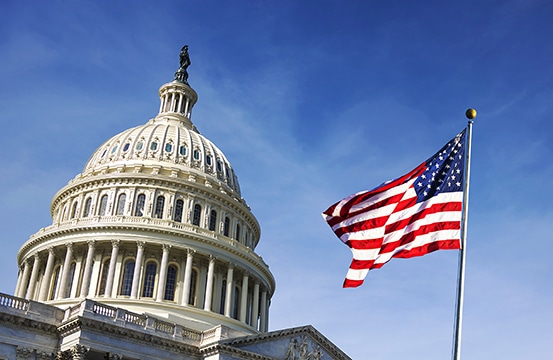The Owner-Operator Independent Drivers Association (OOIDA) continued a busy week on Wednesday (May 13) with a message to the majority and minority leaders of both houses of Congress. The five-page letter included a list of requests for congressional action.
“Congress must provide more targeted relief specific to our industry,” the letter stated, and OOIDA recommended a series of steps.
This letter followed up on a May 6 missive, sent to all senators and representatives, that asked for a requirement that brokers provide electronic copies of the information required in 49 CFR 371.3 to carriers upon completion of the load, as well as a prohibition on contract clauses requiring carriers to waive their rights to this information.
Under 49 CFR 371.3, brokers are required to keep a record of each transaction that includes, among other items, the amount of compensation received by the broker for the brokerage service performed and the name of the payer. Brokers are required to retain these record for three years, and each party to a brokered transaction has the right to review the record of the transaction.
OOIDA’s May 13 letter reiterated those demands and recommended that broker bond requirements be reformed to serve as a greater deterrent to broker malfeasance.
Next was a recommendation that the current suspension by the Federal Motor Carrier Safety Administration (FMCSA) of weight and size requirements be lifted because allowing heavier trucks on the road can result in fewer trucks being needed to haul the same amount of freight in a market where there are already too few loads. The FMCSA recently extended the exemption until June 14.
The letter went on to recommend a repeal of the Fair Labor Standards Act overtime exemption for truck drivers, saying these laws are outdated. Then came a request for hazard pay for drivers who are working through the COVID-19 pandemic, citing drivers’ personal expenses for personal protective equipment, sanitizer and other supplies as part of the justification.
The next section of the letter dealt with the Small Business Administration and the inadequacies in the agency’s ability to get needed funds into the hands of small business truckers.
As in the May 6 letter, OOIDA again asked for a suspension of the heavy vehicle use tax, a $550 annual burden for most Class 8 trucks and their owners.
Finally, the letter called for enactment of H.R. 6104, the Truck Parking Safety Improvement Act.
The letter was signed by OOIDA President and CEO Todd Spencer.
OOIDA also issued a “call to action” to its 160,000 members, asking each member to request information in accordance with 49 CFR 371.3 for every load they accept from a broker. Further, OOIDA asked its membership to report any problems with brokers to the association as well as to the National Consumer Complaint Database. Included with the letter to membership were for- letter templates for members to use n requesting the information.
In an act of defiance, the Transportation Intermediaries Association (TIA), a trade group representing freight-brokerage businesses, followed the OOIDA call to action with a letter to its own 1,800 member companies, reminding them that making load information available at their place of business only during normal business hours is permissible under the regulations. This practice has been roundly criticized by OOIDA, which said in its letter to congressional representatives, “Brokers know this makes it virtually impossible for most carriers to access records.”
In a press release announcing the call to action, the organization included a May 3 tweet sent by President Donald Trump in response to a protest in Washington that started May 1 and is ongoing as of May 14. Rather than acknowledge the protesters, however, OOIDA attributed the reason for the presidential tweet as “public outcry.”
Also quoted was the president’s later tweet acknowledging that truckers are being price-gouged.
The membership letter, signed by OOIDA Executive Vice President Lewie Pugh, stated, “Trucking has often suffered from chronic overcapacity — too many trucks and trailers and not enough freight. The resulting market conditions are magnified right now. While there is no quick or easy solution, hauling cheap freight is not a viable or sustainable approach, and we strongly advise against it — just as we always have.”
With the protest in the nation’s capital entering its 14th day, OOIDA’s call to action and correspondence to Congress provide a welcome assist to the assembled group’s demands for broker transparency. A disconnect remains, however, between members of the protest group, who have been critical of OOIDA, and the organization’s leadership, which is clearly avoiding any association with the protesters.
However, it’s clear that the presence of the protesters in Washington is helping raise awareness of the plight of owner-operators. That’s good for the small trucking business owners who are members of OOIDA, as well as those who are not.
The story below was reported on May 7.
As small trucking business protests continue for the seventh consecutive day in Washington D.C., OOIDA (Owner Operator Independent Driver Association) has stepped into the fray.
The organization sent a letter to Congress on May 6, asking that brokers be prohibited from demanding that carriers waive their rights under FMCSR 371.3, which guarantees access to the full record to every party that participates in a brokered transaction. The full record shows how much the broker was paid for the haul and any additional services provided as well as payment to the trucker.
The OOIDA letter also asked that the regulation be amended to require the broker to provide the information at the completion of the load. In its current form, the regulation states that the recipient must ask for the information. Brokers have instituted rules, such as mandating that the records can only be inspected at their office location during normal business hours, a requirement that effectively prohibits over-the-road truckers from ever seeing the information.
OOIDA had announced that it sent a letter to its 160,000 members on May 1, the day the protest began, warning about dealing with unscrupulous brokers and urging owner-operators to report issues to the FMCSA’s National Consumer Complaint Database, for which a link was provided (https://nccdb.fmcsa.dot.gov/nccdb/home.aspx).
The organization has been criticized by some of the Washington protesters for, in their view, not doing enough to support the demonstration. However, OOIDA’s position on broker transparency is not a new one. Given the attention generated by the ongoing protest in the nation’s capital, the timing of OOIDA’s letter to Congress could generate a more favorable response.
Cliff Abbott is an experienced commercial vehicle driver and owner-operator who still holds a CDL in his home state of Alabama. In nearly 40 years in trucking, he’s been an instructor and trainer and has managed safety and recruiting operations for several carriers. Having never lost his love of the road, Cliff has written a book and hundreds of songs and has been writing for The Trucker for more than a decade.









Any way U see that brokers & big company’ Taking Aventage of the situation. .80 c mile because fuel is cheap! Are they charged 1/4 of what they do before cove 19 ? It doesn’t make sense these numbers.